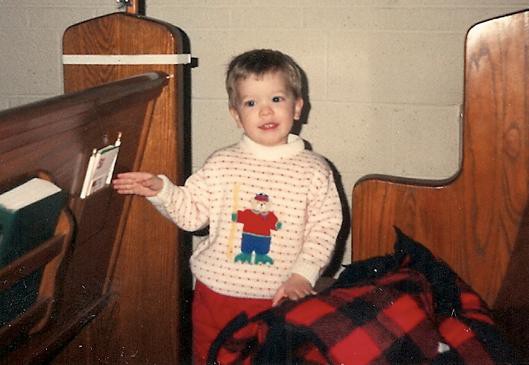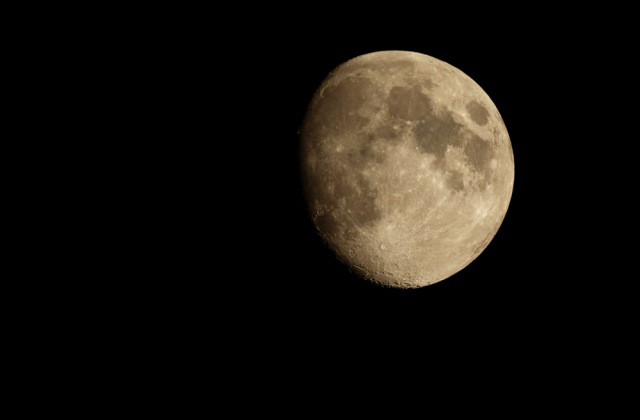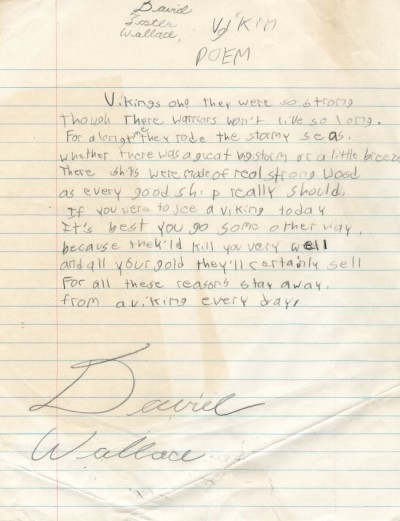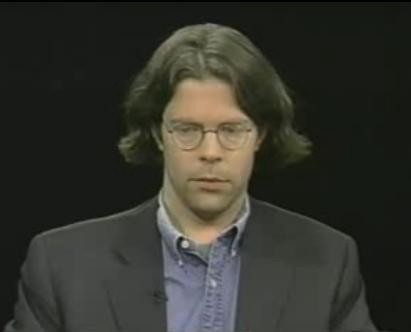I Am the World's Worst Sperm Donor
by Jack Stuef

I don’t know why I’m never quoted in trend-pieces about What the Millennials Are Doing. I’m 23. I live in Brooklyn. I’m a perpetually underemployed graduate of a highly ranked East Coast university. I live with a female roommate who owns a lot of ramekins. And I decided to become a sperm donor to make ends meet In This Economy.
Manual labor jobs are on the decline, you know. Based on how winded I got trying to move a box of books into a new apartment a few months back, I probably couldn’t survive in a manual-labor-based economy, but like anybody with a steady flow of testosterone, I still like to think I could. They also say women are better suited to skills like communication and teamwork, the kinds of things that supposedly make you successful in an office environment. That sort of makes sense for me. I work as a writer, but, like the characters on “Breaking Bad,” I never answer my phone, and when I do try to talk on it, I act like the characters on “Downton Abbey.”
I am actually a little terrified of this idea of women displacing and no longer needing men, if only because I have a lot of free time to spend getting terrified. I’m not sure I should admit this sort of thing on the enlightened Internet, but after e-mailing my resume to five hundred HR representatives who have invariably been female, and very rarely getting even a reply acknowledging I exist, I’ve now come to assume, based on absolutely no evidence, that women discriminate against men in hiring practices. If those theories about men’s unsuitability to the modern economy are right, it makes sense they would do that. Women belong in the conference room, and men belong in the kitchen, making sandwiches for that catered lunch in the conference room.
But still, in a society that no longer needs men for anything, there will definitely be women who are interested in having children. So we will still need sperm donation. I’m fairly sure I wrote a college term paper on why this sort of thing is exploitation, but now I consider it a funny solution to paying my bills. (That’s the difference between being in college and being freshly out of college.) So if sperm donation is the future of the male economy, I might as well get in now before the market is flooded.
This is the sort of rationale with which a man, with his less-desirable brain, needs to arm himself if he’s ever going to make the ludicrous decision to impregnate a bunch of people with children he will never meet.
Here’s another good line of reasoning, one that speaks to angsty, entitled, self-hating, misanthropic Millennials everywhere: sperm donation allows you to populate the world with dozens of little versions of you. It’s the ultimate vengeance on the society that doesn’t yet recognize your amazing gifts.
I’ve never been known to fill palaces with my concubines. I don’t (as of yet) feel any call of nature telling me to spread my seed. But since your elders are actively denying you the jobs that you would allow you entry into the middle class they are simultaneously destroying, filling their lives with your lazy, helpless genetics is one way to get back at them.
Impoverished teenage mothers do not buy vials of sperm. In all likelihood, the children created with your sperm will be born into relatively well-off families. Your sperm kids will go to school with the kids of those people who refuse to read your resume. Your sperm kids will infiltrate their homes, spoiling playdates and ruining their carpet. Then your sperm kids will infiltrate their genetics, through intermixing with the biological children of the privileged.
We shouldn’t be occupying Wall Street’s money banks, is what I’m saying. It’s time to occupy the sperm banks.
This mindset really works. Suddenly the job market no longer makes me feel so inadequate. Clearly it’s time to inflict my children on the world.
It turns out sperm donation, like so many of the world’s most beautiful things, begins on Craigslist. That is where top-notch sperm bank California Cryobank posts a want-ad every few days. From what I can gather from a little Googling, they’re the sperm bank in New York that pays the best, so this is where I applied. (California Cryobank New York is not to be confused with Manhattan CryoBank. Also, there are no sperm credit unions to my knowledge.) “We are constantly recruiting males from all ethnicities, religions, and races, but we currently have an increased need for Jewish, hispanic/Latino, full-blooded Italian, African American, and Filipino men,” their ad read. “We also need full-blooded men of European descent with US citizenship.” I am one of those things!
I took their online screening. I look pretty attractive on paper. I’m over 5’9” tall, between the ages of 19 and 38, and have a degree from a “four-year university.” I have blond hair and blue eyes and probably lots of other recessive genes the rich people crave. The bloodlines are strong; I was lucky enough to get to know most of my great-grandparents before they died, and I had a great-great grandmother who lived to be 107. This father-to-be may have once eaten part of a burrito he found on the street when he was drunk, but he has an incredible family medical history.
A day later, California Cryobank e-mailed me to say that I’d passed the initial screening. I then have to fill out a more extensive application form and bring it in to my appointment.
The importance of discretion with these people is clear. When I called them to schedule my donation sesh, California Cryobank did not give any indication of what their business is when they answer the phone. “Is it okay to leave a detailed message?” the application form asks after requesting my phone number. Nobody involved in this (including me, probably) wants anybody to know I’m a sperm donor. From time to time, I will rendezvous at a certain location and… produce material for them. That’s the deal.
The form telegraphs clearly what they’re looking for in a sperm producer. They want to see that I’ve graduated or am attending college, am healthy, know my ethnic ancestry, am not an alcoholic or drug user, and can detail whether or not my blood relatives have had any of a litany of diseases. (Prospective parents probably wouldn’t want to see that my youngest cousin had lymphoma before he reached kindergarten, so let’s just leave that “cancer prior to the age of 50” box unchecked. I mean, he’s my youngest cousin. He almost didn’t even happen. Wow, it sure is easy to lie on here!)
There are some stranger questions on this form. They want me to list my sexual partners from the past year and any protection I’ve used with them. (Choices include: “i.e., condom; none.”) They want to be sure I haven’t had “persistent white spots” in my mouth or “persistent diarrhea” (presumably not in my mouth). They want to know if I’ve been incarcerated, lived in any weird European countries for more than a month, or have a habit of sleeping with hemophiliacs. And then there’s question 39: “Since 1980, have you ever been injected with insulin?” I thought those scary New York insulin stabbings stopped in the 70s.
Perhaps the most striking thing about this form, however, is how carefully they try to find out just how near gay you get, without ever explicitly asking it. “Within the last 5 years, have any of your sexual partners been male?” it asks. Unsatisfied with that, it has another go a few questions later: “Within the last 12 months, have any of your sexual partners had sex with a male who has had male sexual partners?” Hmm. “All at the same time?” I want to write, but I end up guessing “No.” (Do people actually know these things?)
I’m also asked to give them a few childhood photos of myself (see above) so prospective parents will have some idea what the sperm they’re buying looks like in person form. This seems to be important to California Cryobank. On their website, you can search for sperm donors based on what celebrities they are said look like, with choices ranging from Taylor Lautner to Mike Piazza to Sufjan Stevens, or Colin Hanks to Tom Hanks to “Tom Hanks (young).” So basically you can buy five vials of Ryan Gosling and one Steve Buscemi and play Russian roulette.
There’s one more catch to this process. California Cryobank advertises that donors can earn $1200 a month, at $100 a pop. This seems to be calculated by the fact that their office is only open five days a week, and donors have to wait 48 hours between each ejaculation. In other words, California Cryobank and I would have to be more or less monogamous.
I headed to their offices that Friday morning to give my first sample for them to analyze. Like many things people use for masturbation, California Cryobank’s New York location comes concealed in unmarked packaging: it’s located on the fourth floor of a nondescript office building near Grand Central.
I walked in behind a bearded twentysomething with thick, black-framed glasses (so this is officially a Millennial trend piece!) who appears to be a regular here. California Cryobank has a small waiting room similar to a dentist’s office, but it certainly doesn’t look like one. They have a shiny steel-colored shag rug below a chrome coffee table and uncomfortable-looking modern furniture. The process of conceiving a child with a sperm donor has apparently got to be cold and alienating, and they really did a bang-up job matching the décor to it.
The bearded guy talked with the receptionist in the window, and then was asked to enter some kind of pin number into a keypad. Access inside was approved, I guess, and then he was handed a transparent plastic cup and told to have a great weekend.
I handed in my form and I sat down and looked at the metal swirl of a coffee table, with its unsexy spread of news and action sports magazines. The receptionist eventually handed me a procreation cup of my own and led me through a sealed door. At the end of a hallway, she showed me the lab. A cart blocked the doorway; that’s where I was to set my specimen, in a little compartment, when I’m finished. (Yes, she called it a “specimen.” It seems a little forward for them to already be using the jargon with me. I want to be childish and ask, “What’s a specimen?” and then, “What’s sperm?” and finally, “Wait, babies come from where?!”)
We arrived at a bank of five doors, only one of which was open. The receptionist seemed a bit unnerved. “I guess you’ll have to use this one,” she said.
The room, the size of a small gas-station bathroom, has space for a single stationary office chair, a small table, and a sink. The receptionist left a felt-tip Sharpie and a small piece of paper. “Initial the sticker on the cup and fill out the sheet before you turn them into the cart,” she said. I looked at the sheet. It asked me to write if I “missed any” upon provision of the specimen, and at what point during the ejaculation this occurred.
I closed the door and went to the sink, where a sign is decorated with cartoon sperm telling me to wash my hands before and after. I’m also told to dry them carefully, as water could “contaminate the specimen.”
You already know this, but there’s a neat pile of rumpled Playboys and Hustlers on the table, next to a stack of white paper towels. A sign instructed visitors to replace the paper towel covering the seat of the chair with a new one before I leave.
I touched the arms of the chair and realized why the receptionist seemed reluctant to select this room: the metal on the chair, like the room as a whole, was freezing cold. There was an air vent above pumping out Arctic winds.
Let’s spare you most details. Simply put, physiologically speaking, these weren’t ideal conditions for the male anatomy. This civil conflict turned out to be a war of attrition. I scanned the porn, and there were valiant feats of swordplay, but the line was holding strong. Fifteen minutes in, and I started to panic a bit.
The overall feeling was “pathetic.” I had basically convinced myself that the only possible value I had to society, the only skill I had, the only way I was employable, was to masturbate. I took the subway to do so even. It’s one thing for the job market to make you feel inadequate. It’s another when you can’t even make your basic biology function.
I did realize that I hadn’t actually looked at a porn magazine since my very earliest days as an onanism devotee, and I wondered if that may be the problem. Those same writers telling me boys are falling behind girls in school have also told me boys these days grow up with too much Internet porn and have unrealistic expectations when it comes to real women and sex. Maybe living as a teenager with the Internet and its limitless supply of every kind of high-definition video pornography imagined by a human mind (including the very sickest ones) made me impervious to the classic analog American nudie mag. It just seems so bland.
So, Millennially, I turned to my iPhone. Then I was quickly reminded that Flash doesn’t work on these things. I wondered then if, in perhaps a decade or two, the next generation, one populated by my evil sperm children, will have giant porn machines they can enter that will have sex with them.
Also I’m sure potential parents would be glad to know their donor was imagining his children having sex with a robot while he was generating the specimen.
Twenty-five minutes passed. I realized that receptionist had to be worrying about me in here. That sexy, sexy receptionist who… no. No. I finally noticed the small space heater in the room and realized this is it. This is California Cryobank’s solution to the Hoth room. Eventually the device warmed and I positioned myself over it. If I haven’t been sterilized by my laptop battery or my iPhone by now, this would probably do the trick for that too. At this point, it was just about pride. I had to put something into that cup.
In the end… Grant and Lee signed the treaty. It was over. I realized I was never in the battle to begin with. And I hadn’t gotten this way because the room made me cold. I was this way from the start. Like Michaelangelo’s David, I was tense and afraid. That’s because I didn’t actually want to do this.
What my mind couldn’t stop sorting out was the bigger picture: children that are going to come of this who will likely never know their biological father; a donor who would have children he’d never know. If I did get to meet them — say, under the Open Donor program, for coffee or something, after years of them growing up without me — I would have trouble looking them in the eye and confirming I got a c-note for performing a sex act in a freezing room. I would feel guilty and want to have a relationship with the whole multitude of them, however impossible. At some future Starbucks (where the wifi is in the coffee), they would tell me some of their quirks and look at me expectantly, and I would lie and pretend I share them, so as to take as much credit as possible. I already usually think children I see on the subway seem more intelligent than their parents. I don’t need my ego to make me wonder if it’s because I’m their father. I can’t go through life always knowing there are strangers around me who might be my kids — kids I should be playing catch with or whatever.
It’s rather repulsive for a proud cynic to be this sentimental and have fatherly instincts for a half-handful of bodily fluid, but here we were. The North side of my body, with its superior synapse resources, had won the war. A masturbator divided against himself cannot stand.
Before I left, I took one last look at the Penthouse on the table. Two women stared blankly back at me (instead of at the pair of buttocks they were spreading apart in front of them). They seemed to want something from me, but the only thing I could think about was that all of this magazine’s probably decent-paying modeling jobs were given to women. I wondered if these naked ladies get health benefits. They looked very healthy, at least. Very unstressed about their financial situation. Do they have a 401k plan? Or maybe that form was on to something when it accused me of being gay.
Jack Stuef lives in Brooklyn and is on Twitter, if you can believe it.
Bizarre Campaign Video Features Models Smashing Things
Former Miami Beach mayoral candidate and comedian Steve Berke has made this… thing, for “Americans Elect,” which is having the “first American online primary.” Pretty sure this is all a scam of some kind, but so ELABORATE!
The Moon Is Alive (For Now)

What’s going on with that stupid piece of rock up in space?
Earth’s Moon appears seismically quiet: its major volcanic and tectonic activity is confined to its distant past, as evidenced by the lack of new large-scale features on the surface. However, recent images from the Lunar Reconnaissance Orbiter (LRO) have revealed smaller features that had escaped earlier notice. Several regions exhibit small ravines known as graben that are free of cratering or other marring, which indicates relatively recent formation.
A new paper in Nature Geoscience (by Thomas R. Watters, Mark S. Robinson, Maria E. Banks, Thanh Tran, and Brett W. Denevi) suggests these shallow graben may have formed within the last 50 million years. While this activity is not precisely new, it postdates the last major tectonic activity, which ended roughly 1.2 billion years ago. Since graben form under extension — the stretching of rock by internal pressures — the authors argue that the Moon’s interior may still have a significant molten component, and that its cooling and contraction is producing new features on small scales.
Oh, ho ho ho, the moon is still alive, is it? GOOD. Now we know it will really feel it when we mine the fuck out of it! I mean, I was perfectly happy to blow that stupid piece of shit up even when I thought it was dead — which, for all intents and purposes it is, because it’s COMPLETELY USELESS — but the very idea that it will gasp and cry out as we pierce its crusty shell with our sharp and pointy implements of destruction makes the whole thing even more delicious. Take it all, moon!
Photo by fotum, via Shutterstock
The Pinterest "Opt Out of Theft" System

Photo-rebroadcasting site Pinterest has rolled out a meta tag that disables people stealin’ your photos on Pinterest. It’s a good and smart measure for the company, sure. It doesn’t mean the vast majority of users aren’t copyright infringers, either — but it does protect the company even further than their already totally appropriate DMCA procedures. The vast majority of people will not take advantage of this measure, which makes it seem like they are therefore de facto ceding copyright in exchange for promotion. (Although no action does not equal renouncing one’s copyright, of course.) For instance, I can’t imagine that we’d ever use it: denying readers the ability to share things they love makes readers into non-readers. I want people who see things here to love them and tell a friend! In that way, the web is constantly pushing people to exchange their rights for non-monetary currency. (Though what’s that currency worth? While Pinterest claims “publishers we speak with are excited about Pinterest. We’ve heard that Pinterest drives a lot of traffic to their websites,” we don’t regularly see it turn up in the top 50 traffic referrers. Yet. Wait till Pinterest is the new Google!)
Opera Boring
Rufus Wainwright’s “’Prima Donna’ is so busy being a homage that it has forgotten to be an opera. It is a tasteful, well-intentioned, ultimately mystifying failure: mystifying because, after years of development and performances in Manchester, England; London; Melbourne, Australia; and Toronto, no one has seen fit to give it a plot.”
46 Things to Read and See for David Foster Wallace's 50th Birthday

Today would have been David Foster Wallace’s 50th birthday, and if you’d like to mark it, here are some things that might interest you to read (or watch) and revisit. The list isn’t intended to be comprehensive; for that there’s the Howling Fantods, not to mention this, this and that. This is more like an old trunk, some favorite things that got packed away and today’s maybe a nice day to take them out and rummage around a little: Remember when Frank Bruni peeped inside DFW’s medicine cabinet? etc.
PIECES FROM AROUND
1. “Roger Federer as Religious Experience” at The New York Times (2006).
2–3. The fiction and essays for Harper’s, including: aboard the cruise ship Nadir, “Ticket To The Fair,” “The Depressed Person,” “Laughing With Kafka” and “Tense Present.” You can lose your morning here even if you’ve read them all before, and why not? “Just about every class has a SNOOTlet, so I know you’ve seen them — these are the sorts of six- to twelve-year-olds who use whom correctly and whose response to striking out in T-ball is to cry out ‘How incalculably dreadful!’ etc.” Or: “Hall shakes his gloves at the ceiling as several girls call his name, and you can feel it in the air’s very ions: Darrell Hall is going to get laid before the night’s over.” (Related: Jonathan Franzen’s disclosure that Wallace may have been loose with facts in his reportage.)
4. “Consider The Lobster” for Gourmet (2004).
5. “The Host” for The Atlantic (2005).
6. “Good Old Neon” isn’t available online (it’s in Oblivion); see instead this Ask MetaFilter question, “How do I stop being Neal from ‘Good Old Neon’?”
CHILDHOOD AND COLLEGE

7–8. “The Viking Poem,” written age 6 or 7, and “My mother works so hard,” probably earlier. (Via.)
9. An early, early 1987 profile of Wallace, written by Bill Katovsky, wherein he recalls childhood thusly: “It was an exceptional academic household. I remember my parents reading Ulysses out loud to each other when they went to bed. My father read Moby-Dick to my younger sister and me when we were 6 and 8. There was a near rebellion halfway through the novel. Here we were — still picking our noses — and learning the etymology of whale names.”
10. On his college self in “Brief Interview with a Five Draft Man,” an interview with Amherst’s alumni magazine: “I was one of those people they had to flicker the lights of Frost Library to get out of there on Friday nights who’d be out there right after brunch on Sunday waiting on the steps for them to open the doors.”
11. Some of his college humor writing with friend Mark Costello (co-writer on Signifying Rappers).
“HOW’S IT FEEL TO BE FAMOUS?”
12–13. Michael Pietsch’s editor letter to Wallace re: Infinite Jest; and a 2009 essay by Pietsch on what it was like to edit the book.
14–17. Michiko Kakutani’s mixed-but-engaged review of Broom Of The System was followed by the mixed-but-still-engaged review of Infinite Jest. In a Salon interview with Laura Miller, Wallace mentions the objection of the “very charming Japanese lady from the New York Times” to the novel’s heft. (The Pale King got a mixed-but-engaged reception, too.)
18. The big Frank Bruni Times Magazine profile, “The Grunge American Novel” (oh, grunge), that described riding in a taxi with Wallace to the packed KGB reading: “I have no saliva.” At the reading, Elizabeth Wurtzel was up front, “Ethan Hawke lurked in the back.” Back in Illinois with his friends: “Do you guys know ‘The Charlie Rose Show’? Would you think it was whorish if somebody went on it?”
19. On “The Charlie Rose Show” a couple months later with Jonathan Franzen (denim button-up with sports coat) and Mark Leyner (mob suit). Rose’s big question: In the age of the Internet, what’s the future of the novel? (Spoiler: the novel gives it all up to explore the jungles of Brazil.) The dynamics of male friendship and rivalry on display here are riveting; and Jonathan Franzen’s hair makes me regret that no one makes plaster busts of authors anymore.

20. Wallace, with the white bandanna, was on the show again a year later to talk about A Supposedly Fun Thing I’ll Never Do Again. Rose remains concerned about the novel’s chances against “the allure of technological advancements.” My favorite bit here is when they talk about movies.
21–22. These Bookworm interviews are also great.
23. While on assignment for Rolling Stone, David Lipsky spent five days with Wallace at the end of the Infinite Jest book tour. Wallace was a few years older than him. He talked about the “greasy thrill of fame” (“how’s it feel to be famous?” asked a FedEx guy as he was signing a package). Lipsky recounted his time with Wallace in “The Lost Years & Last Days of David Foster Wallace” for Rolling Stone (not offered online); and then more fully in Although Of Course You End Up Being Yourself, which is based almost entirely on their conversations. (It’s excerpted here, but you’re better off reading the book.)
24. This 1996 online conversation with Word e-zine is a hundred kinds of charming; there are maybe five or six youngish people in the chatroom with Wallace, and he’s really unguarded and fun with them.
dfw: In my very first seminar in college, I pronounced facade “fakade.” The
memory’s still fresh and raw.
Marisa: Keats, I don’t want to know about your problems and feelings.
dfw: I’d like to hear more about keats’s carbuncle, though.
Keats: *sniff* I only mentioned it because I thought it was relevant.
Keats: It’s actually more like a welt.
INDISPUTABLE FAME MARKER
25. Girlfriend Stops Reading David Foster Wallace Breakup Letter At Page 20, at The Onion (2003).
DISPUTABLE FAME MARKER
26. Being interviewed by German TV ZDF that same year.
THE 2005 KENYON COMMENCEMENT SPEECH
27–29. There’s a point (and maybe it’s already approaching) where this speech will seem too needlepointed and sampler-like to remain moving, but for now let’s say it’s not here. (Audio of Wallace delivering the speech, parts 1 and 2.)
FRIENDS, SLEEPING COMPANIONS AND ACQUAINTANCES
30. “Just Kids” by Evan Hughes, about the intertwining relationships between Jeffrey Eugenides, Franzen, Wurtzel, Rick Moody, Mary Karr, Costello and Wallace in the 80s.
31. 2001 piece by Zadie Smith for Eyeshot, then in the U.S. for her White Teeth book tour — if you’ve read it before, re-reading it may give you a whirling feeling of time-travel back to millennial-era Internet:
“So, says Lorrie [Moore], “Is there anyone you really like, who you really wanted to meet?”
Charged by caffeine, I tell her I want to meet David Foster Wallace. I want to meet him so much it’s giving me a hernia. I want to meet him so much that I have had a dream where I meet him sitting on the pavement and he says that we’ve already met and it wasn’t so great and neither of us had much fun and he doesn’t want his hair cut so why don’t I just go home and stop bothering him. In the dream I try to convince him that he could afford to lose at least six inches from underneath that bandana. Maybe we could even do something with the colour. But he walks away without a word. In this dream, I am around thirteen years old, and Mr. Foster Wallace is in his mid-twenties.
Lorrie Moore looks at me queerly. She says, “You know, he’s a perfectly nice guy — I’m sure it wouldn’t be so hard to meet him of you really wanted to.”
I also felt this way in 2001, Zadie.
32. A 2003 interview with Dave Eggers.
33. Above, video from the literary festival Le Conversazioni in 2006, where he appeared with Smith, Franzen, Eugenides and Nathan Englander.
34. Remembrances by former students, longtime readers and correspondents, fellow writers, people who had met him at readings — and a guy who played tennis against him in fifth grade.
DFW’S READING RECOMMENDATIONS
35. “Five direly underappreciated U.S. novels > 1960,” compiled for Salon:
“Wittgenstein’s Mistress” by David Markson (1988)
“W’s M” is a dramatic rendering of what it would be like to live in the sort of universe described by logical atomism. A monologue, formally very odd, mostly one-sentence 6s. Tied with “Omensetter’s Luck” for the all-time best U.S. book about human loneliness.
36. Circling back here to the interview by Laura Miller mentioned earlier, because it includes a really nice short riff on the writers whose stuff “historically… sort of rung my cherries”: “And, my God, there’s poetry. Probably Phillip Larkin more than anyone else, Louise Glück, Auden.”
37. “David Foster Wallace’s 10 favorite books,” topped by The Screwtape Letters.
38–39. Further reading can be cadged from this ’94 syllabus for Literary Analysis: Prose Fiction (Jackie Collins!) or this one for a Spring ’05 Literary Interpretation Syllabus (Coetzee and Silence of the Lambs).
(40. Related to his teaching, a 1987 student evaluation: “Jessamyn has more or less mastered, in the two best stories I saw, a kind of jaundiced, hostile young voice that is both completely convincing and engaging to read.”)
UNBEARABLE
41. D.T. Max’s New Yorker essay about Wallace’s struggle with depression. It came out, you’ll remember, six months after his suicide, and it catches everyone — Karen Green, his parents and sister, friends — in the mid-freefall of their grief, and it’s incredibly rough going — even with Mary Karr zinging up the place — and yet it’d feel wrong not to include it here. Max’s biography Every Love Story is a Ghost Story: A Life Of David Foster Wallace comes out this fall; I’m sure the book won’t lack for blurbs, but if for some reason one’s needed, “Unbearable … incredibly rough going” is now available.
IN THE ARCHIVES
42. The inventory of what’s at the Harry Ransom Center.
43. Some highlights of the archive:
In the margins to his personal copy of Lost in the Funhouse — written by an early pope of American postmodernism, John Barth — you can read along with Wallace as he bristles at the limitations of the high-academic style. Barth’s writing seems to him “Talmudic — obsessed w/its own interpretation” — a line that winds up, nearly verbatim, in the mouth of a Wallace character in the novella Westward the Course of Empire Takes Its Way. (Wallace also wrote character names and plot elements for Westward into the margins of Funhouse, making his copy of the Barth book both a mashup first draft and a vortexlike wormhole of 20th-century American fiction.)
44–45. “Inside David Foster Wallace’s Private Self-Help Library” by Maria Bustillos, published here last spring. (The books talked about in the piece have since been removed from the collection.)
THE ANXIETY OF INFLUENCE
46. And if during this list-making I’ve lapsed into any Wallace-ish phrasings I pretty much wouldn’t be the first.
Rich Man Attracted to Politics
“Russian businessman Mikhail D. Prokhorov… this winter became the first of the post-Soviet set of ultrawealthy financiers to run for president…. Being a billionaire in itself — Mr. Prokhorov owns 20 Jet Skis, a 200-foot yacht and a mansion outside Moscow — might seem a fatal handicap in an era of anger at the rich that is as prevalent in Russia as anywhere.”
— “Might.” Each something gets the something it deserves.
